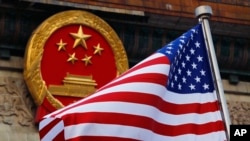The U.S. is not asking anyone to choose between the United States and China, but it is demonstrating the benefits of partnership, U.S. Secretary of State Antony Blinken said Thursday while visiting Saudi Arabia.
Meanwhile, Prince Faisal bin Farhan al-Saud, the Saudi foreign minister, said his country’s partnership with China “is likely to grow.”
“The United States remains the number one partner of choice” for most countries in the Persian Gulf region, Blinken said during a joint press conference in Riyadh.
Prince Faisal said that while China is his nation’s largest trading partner, his country’s “security partnership” with the U.S. “is refreshed on an almost daily basis.”
Blinken’s remarks came as Washington and Beijing are preparing for the top U.S. diplomat’s upcoming trip to China. The trip was rescheduled from February after the U.S. military shot down a suspected Chinese spy balloon that had drifted over the continental United States.
In a tweet this week, U.S. Ambassador to China Nicholas Burns cited White House national security adviser Jake Sullivan’s remarks that the U.S. hopes “Beijing will be willing to include substantive engagement on strategic nuclear issues.”
Burns has postponed in-person events previously scheduled to be hosted by the Washington-based Hudson Institute on June 12 and the Center for Strategic and International Studies on June 16.
A U.S. official declined to say whether the postponement was related to Blinken’s expected trip to Beijing.
During a press briefing earlier this week, VOA asked State Department deputy spokesperson Vedant Patel whether Washington views Beijing as ready to stabilize bilateral ties.
“The international community expects us to manage our relationship with the PRC [People’s Republic of China] responsibly,” he said, regardless of whether it is “addressing the climate crisis, a significant portion of the world’s trade flows through the Taiwan Strait, or addressing fentanyl precursors.”
Chilly reception
In Beijing, China responded with a cold shoulder.
“The U.S. needs to respect China’s core interests and major concerns,” said Chinese Ministry of Foreign Affairs spokesperson Wang Wenbin during a briefing on Wednesday, urging Washington to “stop calling for communication on the one hand and making provocations on the other.”
Ties between the world’s two largest economies have been increasingly strained in recent months over issues including trade, technology and regional security. But U.S. agricultural exports to China continue to grow. China is the largest export market for U.S. agricultural products, according to U.S. Department of Agriculture.
It’s an indication of what trade associations such as the U.S.-China Business Council said both economies should take into account - namely, “the stabilizing and beneficial role of trade.”
But critics are skeptical that Blinken’s trip can fundamentally change fraught relations over differences such as human rights.
“How [do U.S. President Joe Biden and Blinken] plan to ‘thaw’ with a [Chinese government] they have accused of committing genocide, #crimesagainsthumanity?” tweeted Human Rights Watch China Director Sophie Richardson. “What kind of cooperation can they expect?”
Some in Congress say Washington is acceding to Beijing’s demands.
“The Biden administration so desperately wants to meet with top Chinese officials that it is complying with Beijing's demand to bury an FBI report” on the suspected Chinese spy balloon, tweeted Republican Senator Bill Hagerty, who is ranking member of the Senate Banking Committee panel on national security and international trade and finance.
The State Department's Patel on Monday told reporters there was no public update on Blinken's China trip but that the United States looked forward to rescheduling that visit "when conditions allow."
The Financial Times reported the visit could come this month.
'Candid, constructive and fruitful'
The State Department's top official for East Asia, Daniel Kritenbrink, and the National Security Council's senior director for China, Sarah Beran, were in China earlier this week for what Patel described as "candid and productive discussions" with Chinese officials.
China's foreign ministry called those talks "candid, constructive and fruitful communication on promoting the improvement of China-U.S. relations and properly managing differences."
U.S. Defense Secretary Lloyd Austin stressed the need for major powers to have open lines of communication last week ahead of a security conference in Singapore. His Chinese counterpart, General Li Shangfu, declined to meet with Austin on the sidelines of the conference, and while the two did shake hands at the forum, Austin said that was "no substitute for a substantive engagement."




